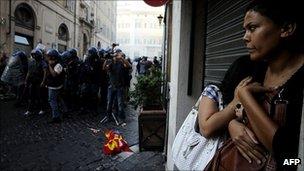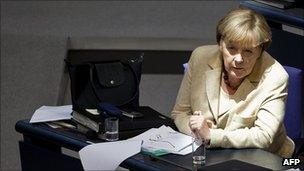Eurozone crisis: Democracy in the balance
- Published
- comments

Democrats fret that people are being sidelined by measures imposed from outside
It is often said that the first casualty in war is truth. It is quite possible that an early casualty in the eurozone crisis will be democracy.
We now know - from a leaked letter - that on 5 August the ECB sent a letter to the Italian Prime Minister, Silvio Berlusconi. The European Central Bank insisted that "bold and immediate" action was "essential".
But it went further, outlining policies that had to be followed before the bank would buy up Italian bonds and so lower the country's borrowing costs. Labour laws needed reforming and further cuts in public spending were necessary. For many Italians, this was a humiliation.
Earlier, it had been the German President Christian Wulff who said that the ECB's purchase of bonds struck at the "very core" of democracy.
"Decisions," he said, "have to be made in parliament in a liberal democracy". These comments were made before it was revealed that the ECB was essentially dictating government policy.
In Greece, government policy is being negotiated with a troika of unelected officials - accountants from the ECB, the IMF and the EU. They have demanded that more spending cuts are necessary if Greece is to qualify for a further trance of bailout money later this month. Without it, the country will be bankrupt.
The troika insisted that the government take the axe to the bloated public sector. So 30,000 civil servants are heading for redundancy. Now, these policies may be necessary and they were signed off by the cabinet and will go before parliament, but to an extraordinary extent in a modern democracy Greece has foreign accountants going through the books of its ministries and recommending policy.
Clamour for action
In Germany, democratic debate remains robust. In the Bundestag last week there was real discussion about whether Germany should support an expanded bailout fund. It was noisy and, at times, impassioned, with Angela Merkel being accused of lacking the most important quality in a democracy - trust.
But a message emerged from the parliament: that they would support increasing the lending capability of the European Financial Stability Facility (EFSF) to 440bn euros (£380bn) - but they did not want to go further. Mention of "euro-bonds" was met with howls of derision.
The German finance minister has made it clear that more taxpayer's money will not be forthcoming. So have the polls. And the papers have echoed this. The Frankfurter Allgemeine Zeitung said the vote gave "no carte blanche for a rescue orgy". Bild weighed in with "this time it has to be enough".
But, led by US President Barack Obama and his Treasury Secretary Tim Geithner, there is international clamour for more action. Europe has to speak with a single voice and take decisive action. The British Chancellor, George Osborne, has said that the logic of monetary union leads directly to fiscal union.

Angela Merkel is caught between the German people and international demands for action
All of this pressure is aimed at Germany. What do these siren voices want? They want Germany's economic strength to be deployed behind Europe's debts. This might be achieved through euro-bonds or borrowing against the EFSF. The international community does not mind, as long as Germany answers the question that if any eurozone country gets into trouble, it will be helped.
Scant regard is given to the will of the people. Every indicator suggests the German people do not want it. Indeed, a weekend poll indicates that 50% of the German people want the Deutsche mark back. That is why Chancellor Merkel has said that there will be no "debt union". It is one of her red lines. For all of this she is attacked as a prevaricator. "Her hesitation will cost the German taxpayer a lot of money," said one accuser. Cautious she may be -but she is mindful of her voters.
Implications immense
Of course, all democratic leaders sometimes have to take their people in a direction they do not want to travel. That is also part of democracy. Mrs Merkel has begun the process of persuading. "Without the euro, there is no Europe," she has said. Defending the single currency has been proclaimed as a German national interest.
But democracy is hugely treasured in Germany. The wishes of the voters cannot simply be ignored. A senior German financier told me that for him defending democracy was more important than defending the single currency.
Although it will have little impact on the immediate crisis, Europe's leaders have taken big steps towards co-ordinating national tax and spending policies in the future.
Last week, the President of the European Commission, Jose Manuel Barroso, said: "We can now discuss member states' budgetary plans before national decisions are taken." The implications for democracy are immense. As the Times observed in an editorial, "decisions over national budgets should be taken exclusively by national parliaments accountable to their electorates".
And then there is Greece. Despite all the demands from outside, the Greek government has admitted that it will fail to reach its target of reducing the deficit to 7.6% of GDP for 2011-2012.
Increasingly, the Greek people are resisting austerity. There may come a moment when simply a society refuses to take medicine administered from outside. It was instructive to see the range of strikers and protesters last Friday.
Nurses were first out. Then, at 11 o'clock, it was the municipal workers. Then the "help at home" staff for the elderly began a 24-hour strike. At mid-day it was high school students, primary and secondary teachers. Also at 12:00 the Communist-backed students union began a march towards parliament. An hour later it was the retired military, angry about their pensions. Then it was tax collectors opposed to their wage cuts, etc etc.
The calculation is, of course, that if the eurozone crisis is fixed then voters will forgive and forget - but what will have been the price? As Nicholas Veron, the economist, observed, the crisis "will test the resiliences of societies socially and politically".